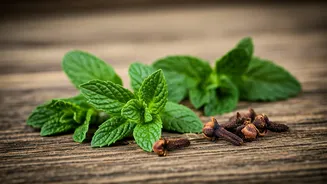Unwelcome Guests, Beware
Mice can be persistent intruders, seeking shelter and sustenance within our homes. While numerous commercial products promise rodent control, many contain
harsh chemicals that can be harmful. The good news is that there are natural alternatives, utilizing the power of scent, which is a key sense for mice. This article will unveil six smells that mice find particularly offensive, offering practical, eco-friendly strategies for repelling them. These methods not only deter mice but also align with a healthier living environment, free from the worries of toxic substances. From readily available kitchen staples to potent essential oils, you can create an effective defense against these unwelcome guests.
The Power of Peppermint
Peppermint oil stands out as a top contender in the natural pest control arena. Mice, with their sensitive noses, are strongly repelled by its strong, invigorating scent. The application is relatively straightforward: you can soak cotton balls with peppermint oil and strategically place them in areas where mice are likely to enter or hide, such as near entry points, along baseboards, and in storage areas. Consider refreshing the cotton balls regularly to maintain their potency, as the scent tends to dissipate over time. In addition to cotton balls, peppermint oil can also be combined with water in a spray bottle. This mixture can then be applied around the perimeter of your house, around doorways, and other areas where mice might be tempted to explore. You can also plant peppermint around the perimeter of your house to deter the rodents. This method is not only effective but also leaves your home smelling fresh and clean, rather than filled with harsh chemical odors. Remember, peppermint oil is a concentrated substance; always dilute it or use it with caution.
Vinegar's Vexing Vapor
White vinegar, a common household item, is another powerful tool in the fight against mice. The strong, acidic smell of vinegar is something mice actively avoid. It can be utilized in several ways to deter these pests. One effective approach involves mixing equal parts of white vinegar and water in a spray bottle. This solution can be sprayed in areas where mice have been seen or are likely to venture. Focus on areas such as cracks, crevices, and entry points. Similar to peppermint oil, the solution needs to be reapplied periodically to maintain its effectiveness. Another option involves soaking cotton balls in undiluted vinegar and placing them in key areas. The intense smell of undiluted vinegar can be particularly potent, so use this method with caution, particularly in areas where you spend a lot of time. While vinegar's smell might be less pleasant to humans than peppermint, it is a readily available, non-toxic, and affordable solution for mouse control, making it a great choice for those seeking a natural approach.
Essential Oil Defense
Beyond peppermint, several other essential oils have proven effective in repelling mice. These include clove, cinnamon, and cayenne pepper oils. Like peppermint, these oils have potent scents that mice find unappealing. You can apply these oils in similar ways as peppermint, either by soaking cotton balls or creating a diluted spray. When using these oils, be mindful of their concentration. They are powerful, and excessive use can be irritating. Always conduct a spot test to ensure they do not damage any surfaces or materials. Moreover, it's wise to vary the scents. Mice can sometimes become accustomed to a single scent over time, reducing its effectiveness. By rotating between different oils, you can ensure the mice do not get comfortable with the scent and will continue to avoid your home. This approach will offer continuous and robust protection.
Spice Rack Deterrents
Spices that add flavor to your cooking can also be enlisted in the fight against mice. Cinnamon, clove, and cayenne pepper are particularly effective. The pungent smell of cinnamon and clove, often used in baking, is highly disliked by mice, making them excellent deterrents. You can sprinkle these spices in areas where mice are likely to appear. For a more focused approach, consider creating a mixture of water and these spices, then spraying it in problematic areas. Cayenne pepper, with its spicy heat, offers a more potent deterrent. Sprinkle cayenne pepper near potential entry points or areas where mice have been sighted. The heat from the pepper can be an additional deterrent. When using these spices, be aware of their potential for mess and staining. Consider testing them on an inconspicuous area first. Also, wearing gloves is advised when handling cayenne pepper to prevent skin irritation.
Beyond Smell Alone
While scent-based deterrents are highly effective, a comprehensive approach to mouse control involves more than just smell. It's crucial to eliminate the factors that attract mice in the first place. Seal any cracks or holes in your home's foundation and walls to prevent their entry. Store food in airtight containers, as mice are attracted to easily accessible food sources. Keep your home clean and tidy, ensuring no crumbs or spilled food remain. Clear up any clutter, as this offers mice places to hide. Regular inspections will help identify any potential entry points and monitor for any signs of mouse activity. By combining natural repellents with these preventative measures, you can create a truly effective and sustainable strategy to keep mice at bay and protect your home naturally. This will also ensure a healthier and more comfortable living environment.













